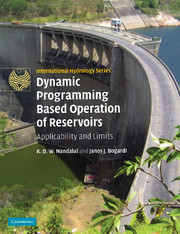Book contents
- Frontmatter
- Contents
- List of figures
- List of tables
- Preface
- 1 Water resources management
- 2 Incremental dynamic programming in optimal reservoir operation
- 3 Stochastic dynamic programming in optimal reservoir operation
- 4 Optimal reservoir operation for water quality
- 5 Large-scale reservoir system operation
- 6 Optimal reservoir operation for flood control
- References
- Index
Preface
Published online by Cambridge University Press: 14 August 2009
- Frontmatter
- Contents
- List of figures
- List of tables
- Preface
- 1 Water resources management
- 2 Incremental dynamic programming in optimal reservoir operation
- 3 Stochastic dynamic programming in optimal reservoir operation
- 4 Optimal reservoir operation for water quality
- 5 Large-scale reservoir system operation
- 6 Optimal reservoir operation for flood control
- References
- Index
Summary
The second half of the twentieth century can clearly be identified as an epoch having a strong, lasting imprint on our paradigms and methods of resource use and management. Ideas, compassions, and concepts which dominate our thinking and debates have emerged and evolved during the last four or five decennia. Nothing manifests this better than the so-called Brundtland Report (WCED, 1987). Ever since its publication, the term and concept of sustainable development cannot be missed in any declaration or framework issued or developed in seeking better conditions for humans and the environment alike. The recent millennium was a welcome opportunity to summarize this process and endorse principles and set new objectives. As far as the ethical, political, and practical aspects of water resources management are concerned, the large intergovernmental environmental conferences like the United Nations Conference on Environment and Development (UN, 1992) and the World Summit on Sustainable Development (WSSD, 2002) can be mentioned along with the formulation of UN Millennium Development Goals (MDGs, 2000) and the Millennium Ecosystem Assessment (2005). Beyond these general conferences and assessments, where water took a substantial part of the agenda, the world water fora (Marrakech, 1997; The Hague, 2000; Kyoto, 2003; Mexico City, 2006) and the Bonn Conference on Freshwater 2001 provided the broadest platforms for stakeholder dialogue involving ministerial, NGO, scientific, professional, and other interest groups, and indigenous people participation. The impacts of these conferences were analyzed by, among others, Bogardi and Szöllösi-Nagy (2004).
Information
- Type
- Chapter
- Information
- Dynamic Programming Based Operation of ReservoirsApplicability and Limits, pp. xi - xivPublisher: Cambridge University PressPrint publication year: 2007
